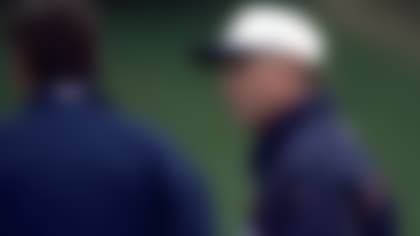On consecutive days last weekend, John Fox was hospitalized after feeling light-headed while golfing during the Denver Broncos' bye week, and Gary Kubiak fell to his knees while coming off the sideline at halftime of Sunday night's game between his Houston Texans and the Indianapolis Colts. Fox ended up having to undergo an aortic heart valve replacement that will sideline him at least several weeks, while Kubiak is unlikely to coach this weekend's game against the Arizona Cardinals after suffering what doctors labeled a mini-stroke.
While these analogous news stories were startling to many, the least surprised people in the world were former NFL coaches. We've all felt worn down to nothing at one point or another.
I want to make sure I state this clearly: Those of us in this fraternity are ridiculously well-compensated, both monetarily and socially, and the job is one of the greatest in the world if you enjoy urgent, rewarding work with interesting people. The fame doesn't hurt, either; a lot of folks work hard at their jobs, but not a lot of them have 70,000 people cheering for them when it goes well.
That said, the job takes a physical and emotional toll that's hard to quantify and often harder still to talk about. I've heard the business of football compared to the space program, and they are similar in a broad sense: both feature a large support staff preparing a team of physically adept people for a precise series of maneuvers that will, by necessity, threaten great physical danger. When it goes well, the respect and interdependence of all those involved is powerful and intoxicating.
But there's a flip side to all that hard work, of course: You spend massive amounts of time away from your family, you push yourself to extreme exhaustion and beyond -- the drug of choice among most football coaches is Diet Coke, consumed in copious amounts -- and you compete in an unforgiving forum, with a rapt public hanging on the outcome of each game. As head coach, you have to answer for each and every organizational misstep.
People who get into football coaching are driven to begin with, so what do they do when times get tough? Drive themselves harder. In his first head-coaching job (with the Philadelphia Eagles from 1976 to 1982), Dick Vermeil lived in his office for days on end, eventually becoming the most visible symbol of burnout in the coaching fraternity. Throughout the decades, we've seen the most extreme examples, including Jon Gruden and his famous 3:12 a.m. alarm-clock wakeup, as well as Gunther Cunningham showing up to work at 5 a.m. on Christmas morning -- the day after the end of a losing season. Coaches who appear svelte and sensible in August look zombified and pudgy by the end of the season, like hostages emerging in the light of day.
In the media-saturated age of the modern NFL, the coach is the face of the franchise, so taking a couple days off to rest is not really an option. Even major physical disorders are swept under the rug. It took Chuck Pagano's wife insisting he go see his doctor during the Colts' bye week last year for the coach to learn he had leukemia. We now know that Fox had been aware of his heart condition for months, and, just as you would expect from a football coach, he initially planned to delay the necessary surgery until after the season.
In Fox's absence, defensive coordinator Jack Del Rio has taken over as interim head coach of the Broncos, while fellow D-coordinator Wade Phillips is filling in for Kubiak in Houston. Del Rio and Phillips both make perfect sense in interim roles, as you like having someone who's been a head coach in the NFL and won't be fazed by the novelty of the experience. Also, there's a case to be made that it's easier to step into the job on short notice if you're on the defensive side of the ball. After all, most of the either/or decisions a head coach must make -- Go for it or punt? Go for it or kick a field goal? Extra point or two-point conversion? -- crop up when the offense has the ball. Jack coached with me in Baltimore, and he's smart -- he'll know that his job is not to alter the plan, but merely extend what John Fox already has in place.
As for the larger issue of coaching stress, one of the things we've heard in the past few days is a renewed call to limit the number of hours coaches put in. This wouldn't work, for a number of obvious reasons -- sure, you could lock up team offices at a certain hour, but coaches would just watch film at home -- but also because it wouldn't really get at the crux of the dilemma. The core problem with football coaching isn't the hours themselves, it's the pressure (internal and external) that spawns such hours.
You are, at some broad level, responsible for the actions of 53-plus rich young men, and you're judged by how well they perform in an exacting, violent, unforgiving and public job. You are also the public representative for a support staff that can include as many as 200 people -- not just coaches, trainers, therapists and doctors, but also administration and marketing people -- and are held accountable for every single thing that occurs within the organization.
In addition to all of that, you are consumed with planning, spending as much time each week as humanly possible trying to devise a strategy that will help those 53 men win a football game against another team of equally talented individuals, coached by an equally driven, intelligent group of men. If you're not consistently successful in that endeavor, many in the public -- and some within the organization -- will turn on you, and your livelihood will be threatened.
Given everything that's at stake, coaches naturally drive themselves beyond the point of good health and common sense, striving to find some extra edge and measure of control over the unruly events of the season.
I was blessed. I stayed in good shape during the season, exercising as regularly as I could, and I avoided the trap of thinking that working longer is the same as working smarter. But the stress can assert itself in unusual ways.
One year, I started having heart palpitations during games -- on more than one occasion, I thought I might have been having a heart attack. Our team physician, Andy Tucker, talked me through the symptoms and did a battery of tests, finding nothing out of the ordinary. Then he shadowed me on game days for a couple of weeks. Afterward, he asked me how much coffee I typically drink. I told him one or two cups a day, as I'm not a big coffee drinker. But he noticed Sundays were different; I would change my morning routine. On game days, I'd have a cup when I got up, another while reading the paper, one during breakfast and a fourth on my walk to the stadium. Andy told me, "You're drinking enough coffee that after the game, you're not only not tired, you could probably start vacuuming the garage."
In that instance, my solution was easy: cut down on the caffeine. Some cases are far more difficult.
Coaches are used to bunkering in -- keeping their insane hours the same after wins and redoubling their efforts after losses. The great myth in pro football -- We can outwork the other guys -- is a lie, and a dangerous one at that. The saving grace for all coaches is that, if you're fortunate enough to be in the business long enough, you realize that you coach best and teach best when you are refreshed. Despite countless medical advances, there are no pills that can replace a healthy diet and a reasonable amount of sleep. Being at your best still requires rest, exercise and the self-discipline to recognize when your hard work is yielding diminishing returns. Those things are just more difficult to come by for head coaches in the NFL.
We can blame the schedule, the competitiveness, the media or the public thirst for news, but in the end, it's on us. We do this to ourselves.
Follow Brian Billick on Twitter @coachbillick.




